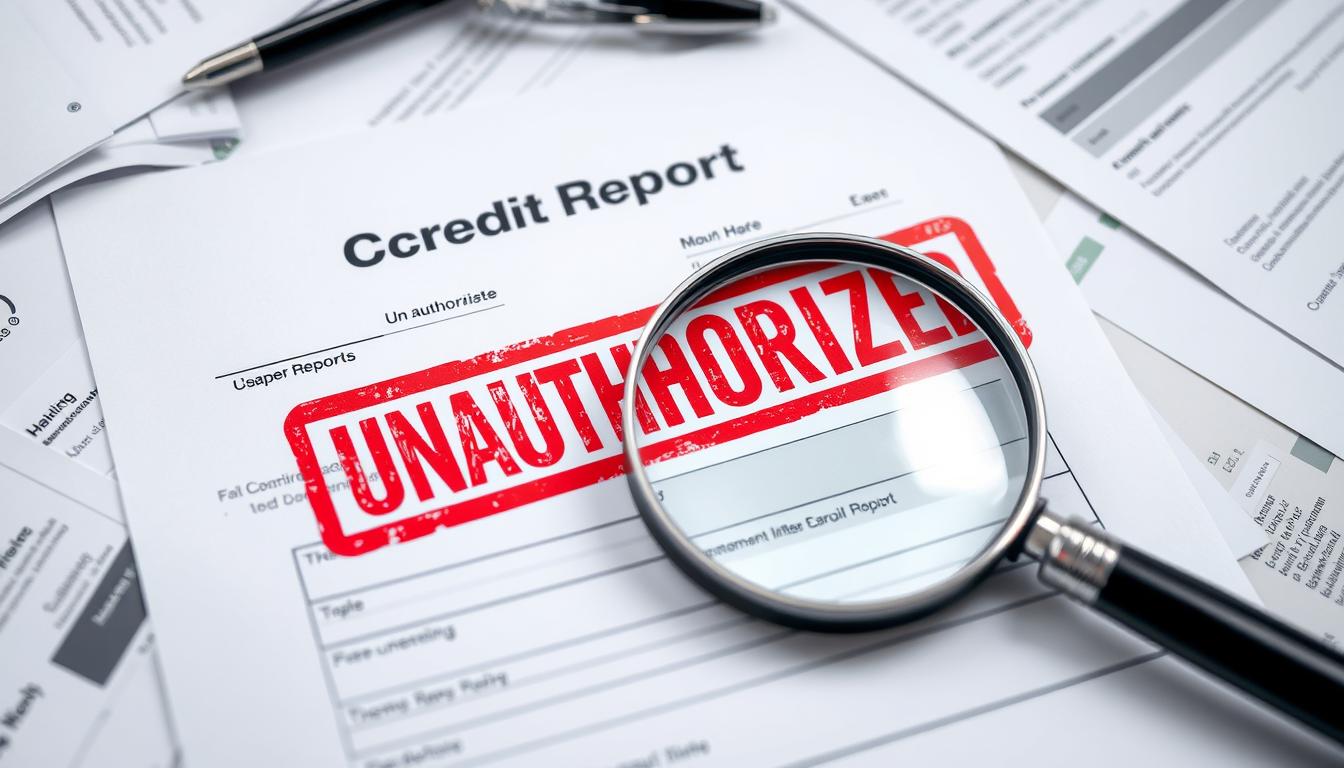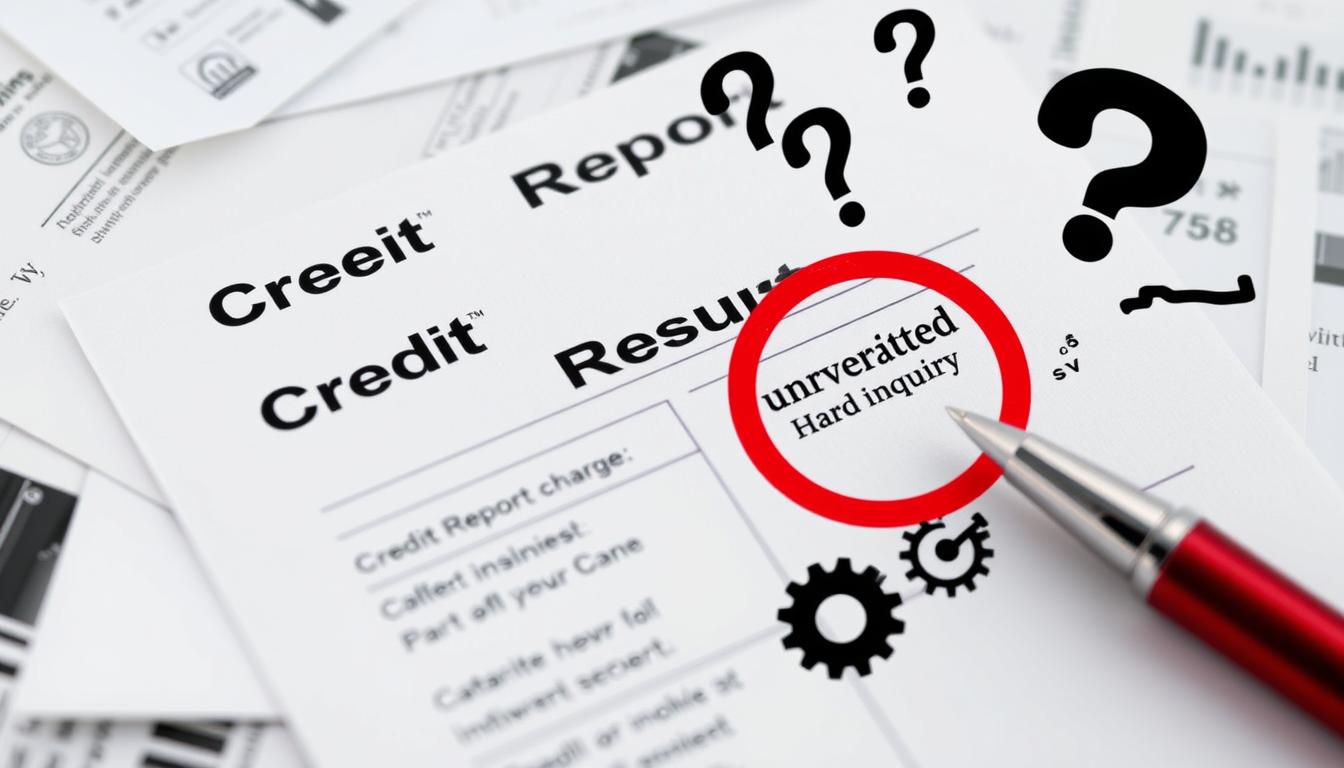Here’s the rewritten content for the paragraph enclosed in p tags:
Finding an unauthorized hard inquiry on your credit report can be worrying. Hard inquiries occur when lenders check your credit for loan applications. Sometimes, these inquiries are legitimate. However, an unexpected one might signal identity theft or a mistake.
Hard inquiries can affect your credit score. It’s crucial to address any that don’t belong to you. This guide will help you tackle unauthorized hard inquiries on your credit report.
Understanding Hard Inquiries
Hard inquiries are credit checks that happen when you apply for new financial products. They’re a normal part of the credit application process. However, they can briefly affect your credit score.
What is a Hard Inquiry?
A hard inquiry, or “hard pull,” is a credit check when you apply for credit-based products. It’s recorded on your credit report and may impact your score. Soft inquiries, like checking your own credit, don’t affect your score.
Impact of Hard Inquiries on Credit Scores
- Hard inquiries can cause a small, temporary dip in your credit score, typically between 5-10 points.
- The impact of a hard inquiry generally lasts for around 12 months, although it may continue to be reported on your credit report for up to 2 years.
- Applying for multiple credit products in a short period, such as shopping for a mortgage or auto loan, is typically counted as a single inquiry, as long as the applications are within a 14-45 day window.
Knowing the difference between hard and soft inquiries helps manage your credit health. It’s important to understand how hard inquiries affect your score.
If you spot a hard inquiry on credit report not mine, investigate its source quickly. Take action to protect your credit if needed.
Why You Might Find an Unauthorized Hard Inquiry
An unauthorized hard inquiry on your credit report can be alarming. It’s crucial to understand why this happens and how to address it.
Identity theft is a common cause of fraudulent credit inquiries. Criminals may use your personal info to apply for credit without your consent. This can damage your credit score.
A clerical error by a lender or credit bureau is another possibility. Sometimes, lenders accidentally record inquiries for applications you didn’t submit. These mistakes can lead to unauthorized hard inquiries.
- Unauthorized credit check
- Fraudulent credit inquiry
- Credit report discrepancy
- False credit report entry
Knowing why unauthorized inquiries occur helps you protect your credit. Stay alert and act quickly to minimize the impact on your finances.

“Monitoring your credit report regularly is essential to catch any unauthorized activity or inaccuracies that could harm your credit profile.”
Signs of an Inaccurate or Fraudulent Hard Inquiry
Stay alert for signs of illegitimate hard inquiries on your credit report. Look out for unfamiliar creditor names. Watch for inquiries related to loans you never applied for.
Unfamiliar Creditor or Lender Name
An inaccurate credit report might show inquiries from unknown companies. This could indicate a fraudulent credit inquiry. Review these details carefully to spot potential credit report errors.
If you find suspicious entries, consider disputing them as false credit report entries. Quick action can help protect your credit score.
Inquiries for Loans You Didn’t Apply For
Hard inquiries for loans you didn’t request are major red flags. These could signal identity theft or fraud. Inquiries for loans you didn’t apply for demand immediate attention.
Act fast to protect your credit and financial health. Report suspicious activity to credit bureaus and relevant authorities.
Regularly check your credit report for unusual hard inquiries. This habit helps maintain a healthy financial profile. Stay proactive to safeguard your creditworthiness.

Steps to Take When You Find a Hard Inquiry on Credit Report Not Mine
Found an unknown hard inquiry on your credit report? Don’t panic. Take quick action to fix the issue and protect your credit score. Here’s what to do:
Review Your Credit Report Thoroughly
Carefully check your credit report for details of the mistaken hard pull. Note the lender’s name and inquiry date. Look for other disputed credit inquiries or incorrect credit inquiries that need attention.
Contact the Credit Bureau
Reach out to the credit bureau responsible for the credit report error. Explain the situation and ask to remove the disputed credit inquiry. Be ready to provide proof to back up your claim.
Acting quickly can help resolve the hard inquiry on credit report not mine. It protects your credit profile from potential harm. Fixing credit report errors is key to maintaining a good credit score.

Disputing an Unauthorized Hard Inquiry
Discovering an unauthorized hard inquiry on your credit report requires immediate action. You can dispute this inaccurate entry with credit bureaus to protect your credit profile. This process helps address the issue effectively.
To dispute, gather essential information about the inquiry. This includes the creditor’s name, inquiry date, and other relevant details. Obtain a copy of your credit report to verify the disputed inquiry’s accuracy.
- Contact the credit bureau(s) where the unauthorized hard inquiry appears and initiate a dispute.
- Provide a written explanation detailing the inaccuracy or fraudulent nature of the hard inquiry, along with any supporting documentation.
- Request that the credit bureau investigate the disputed credit inquiry and remove it from your credit report if it is found to be inaccurate or unauthorized.
- Follow up with the credit bureau to ensure that the dispute is resolved in a timely manner.
If the investigation confirms the hard inquiry is unauthorized, the bureau must remove it. This can improve your credit score and protect you from negative impacts.
| Disputed Credit Inquiry | Inaccurate Credit Report | Credit Report Discrepancy | False Credit Report Entry |
|---|---|---|---|
| An unauthorized hard inquiry that appears on your credit report, often as a result of identity theft or a creditor’s mistake. | A credit report entry that contains incorrect or misleading information about your credit history, payment history, or other financial activities. | A mismatch between the information on your credit report and your actual financial records or activities. | A credit report entry that is completely fabricated or does not accurately reflect your true credit history. |

Addressing unauthorized hard inquiries is crucial for maintaining an accurate credit profile. Following the proper dispute process protects you from potential consequences of false entries. It helps ensure your credit report’s integrity.
Protecting Yourself Against Fraudulent Hard Inquiries
Unauthorized credit checks can harm your credit report. But you can take action to protect yourself. Stay alert and proactive to safeguard your financial well-being.
Monitor Your Credit Report Regularly
Check your credit report often to spot credit report errors. This helps you catch suspicious activity early. Review reports from Experian, Equifax, and TransUnion yearly.
Place a Fraud Alert or Credit Freeze
- If you think your info is compromised, place a fraud alert. This makes it harder for others to open accounts in your name.
- A credit freeze is another option. It blocks access to your credit report. This prevents unauthorized parties from getting a credit check.
These steps can protect you from unauthorized credit checks. They help secure your credit profile against fraudulent credit inquiries. Stay watchful and take charge of your financial security.
Hard Inquiry on Credit Report Not Mine
Found a hard inquiry on your credit report that’s not yours? Act fast. Hard inquiries can hurt your credit score and might signal identity theft or errors.
Start by checking your credit report for any odd entries. Look for unfamiliar lenders or credit applications you didn’t make. These could point to an inaccurate credit report or a credit report discrepancy.
- Identify the source of the hard inquiry on credit report not mine
- Determine if the inquiry is related to a false credit report entry
- Gather any supporting documentation or evidence to support your case
Next, contact the credit bureau responsible for the unauthorized inquiry. Explain your situation clearly and ask them to remove the incorrect information. Be ready to provide proof to back up your claim.
“Identifying and addressing unauthorized hard inquiries on your credit report is an essential step in maintaining the accuracy and integrity of your credit profile.”
Quick action and proper disputing can resolve hard inquiries on credit report not mine. This helps protect your credit score and financial health.
Potential Consequences of Unauthorized Hard Inquiries
Discovering a hard inquiry on credit report not mine can seriously affect your finances. Unauthorized credit check or inaccurate credit report entries may harm your financial health. Let’s look at how these credit report errors can impact you.
Hard inquiries, even unauthorized ones, can temporarily lower your credit score. Lenders see multiple hard inquiries as a risk sign. Your score might drop a few points or more, depending on the number of inquiries.
Unauthorized credit checks can make getting future credit harder. Lenders may view these inquiries as red flags. This could lead to higher interest rates or even credit denials.
| Consequence | Impact |
|---|---|
| Decreased Credit Score | Temporary drop in credit score due to hard inquiry on credit report not mine |
| Difficulty Obtaining Credit | Lenders may view unauthorized credit check as a risk factor, leading to higher interest rates, less favorable terms, or credit denials |
| Financial Stress | Inaccurate credit report entries can cause financial distress and impact your ability to secure loans, credit cards, or even rental agreements |
Credit report errors can cause broader financial stress. They may make it hard to get loans, credit cards, or rental agreements. This can create challenges in managing your finances and reaching your goals.
Quickly addressing hard inquiry on credit report not mine is crucial. It helps protect your financial well-being. Take proactive steps to minimize the impact of unauthorized credit checks and maintain a healthy credit profile.
Preventing Future Unauthorized Credit Checks
Protecting your personal info is vital to avoid unauthorized credit checks. These are also called fraudulent credit inquiries or mistaken hard pulls. Taking action can reduce the risk of errors on your credit report.
Be Cautious with Personal Information
Be careful when sharing your personal details. This includes your Social Security number, birthdate, and address. Only give this info to trusted sources like your bank.
Don’t share sensitive data over public Wi-Fi. Be wary of unsolicited calls or emails asking for your information.
Limit Credit Applications
Reduce unauthorized checks by limiting credit applications. Each application can result in a hard inquiry on your report. This can negatively impact your credit score.
Consider pre-qualifying for credit offers. These usually result in a soft inquiry that doesn’t affect your score.
These steps can help protect your credit report from unauthorized credit checks and fraudulent credit inquiries. By doing so, you’ll safeguard your financial well-being.
Understanding Your Rights Under the FCRA
The Fair Credit Reporting Act (FCRA) protects your credit information rights. It ensures credit agencies keep accurate records about you. You can dispute errors, including hard inquiries on credit report not mine.
The FCRA outlines a clear process for addressing credit report errors. You can dispute issues directly with the credit bureau. They must investigate and remove any inaccurate information from your inaccurate credit report.
This process shields consumers from unauthorized hard inquiries on credit report consequences. It helps prevent unfair lowering of credit scores.
Knowing your FCRA rights helps protect your credit profile. Regular monitoring can catch irregularities early. Quick action against mistakes or fraud is crucial.
Stay informed and vigilant to maintain a healthy credit history. This approach safeguards your financial well-being. It helps you address hard inquiries on credit report not mine promptly.

